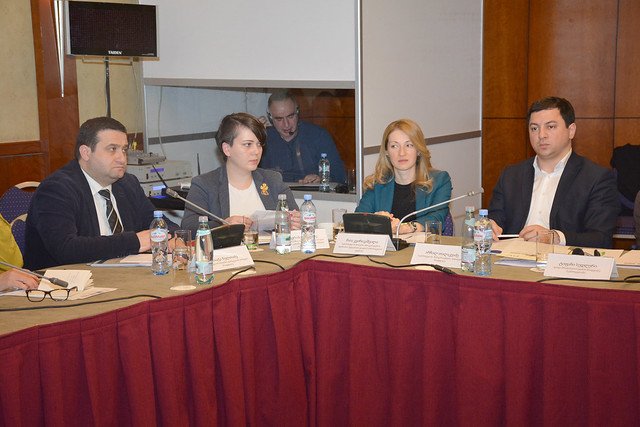Public Debate: Early Marriage - Challenges and Solutions
On March 25, 2016, the Public Defender held a public debate on the topic: "Early Marriage: Challenges and Solutions". The aim of the public debate was to organize open discussion about the situation and challenges of early marriage in Georgia and to make future plans in this direction by participation of non-governmental, governmental and international organizations.
In his opening speech the Public Defender reiterated that prevention of early marriage is one of the main priorities of his Office and talked about the major trends in the field. He also noted that forced marriage and engagement are widespread practices in the country. The main challenge is wrong and low awareness of the public, as well as gaps in the delivery of services and inefficient response mechanism.
Deputy British Ambassador to Georgia Tiffany Sadler noted that early marriage is a common problem worldwide and needs special attention, because every year millions of girls drop out of school and stop development. The Deputy Ambassador also mentioned the importance of the Public Defender's special report on early marriage, which was prepared by the support from the British Embassy.
The event was moderated by the head of the Georgian Office of the United Nations Population Fund (UNFPA), Lela Bakradze, who spoke about the causes and consequences of early marriage in her introductory speech. She also reviewed the major recommendations for the prevention of early marriage.
Deputy Minister of Education and Science Lia Gigauri spoke about the role of educational institutions in the prevention of early marriage and in raising students’ awareness on the relevant issues, as well as the Ministry’s activities, including the introduction of a register system of school dropout by students and the existent statistical data.
Deputy Minister of Labour, Health and Social Affairs Nino Berdzuli talked about the role and involvement of social workers, the implemented and planned activities in the health area, including strengthening of the role of doctors. The speaker noted that development of guidelines for doctors was of great importance for the prevention and identification of early marriage and violence cases.
Deputy Minister of Internal Affairs Archil Talakvadze highlighted the strengthened and effective responses by law enforcement bodies and reviewed the statistical data. He noted that the Ministry is ready to implement more changes to increase the role of police in the prevention of early marriage and management of cases. Maia Kvirikashvili, Head of the Chief Prosecutor’s Human Rights Department, focused on the rate of criminal prosecution and the main issues of the enforcement of law. She also spoke about the planned activities, aimed at improving the analysis of international practice and statutory regulations.
Ana Arganashvili, a representative of NGO Partnership for Human Rights, talked about the importance of recognition of the problem of early marriage and the use of correct definitions. The speaker noted that violation of juveniles’ interests and violence cannot be justified by "creation of a family". She also reviewed the inter-agency coordination problems and shortcomings in ensuring effective responses both by law enforcement agencies and social service providers.
Ekaterine Skhiladze, Head of the Department of Gender Equality of Public Defender's Office, presented key findings of the Public Defender's special report "Early Marriage: Challenges and Solutions". She noted that early marriage is closely linked to gender inequality, while inefficient delivery of services and wrong attitudes in the public still remain to be problems.
Mariam Jajanidze, Human Rights Advisor to the Government’s Secretariat, focused on the inter-agency coordination issues and future plans. She gave an overview of the measures included in the national action plan for the prevention and case management of domestic violence and early marriage.
After the delivery of speeches, discussion was held, during which the audience was given the opportunity to ask questions to the speakers and express their opinions. The meeting was attended by teachers and representatives of local authorities from Bolnisi, Marneuli and Dmanisi, which talked about the problems and specific cases of Shida Kartli region in their speeches.
The event was held within the framework of the EU project "Support to the Public Defender's Office" and the British Embassy project "Protection of girls’ rights and prevention of early marriage".
















